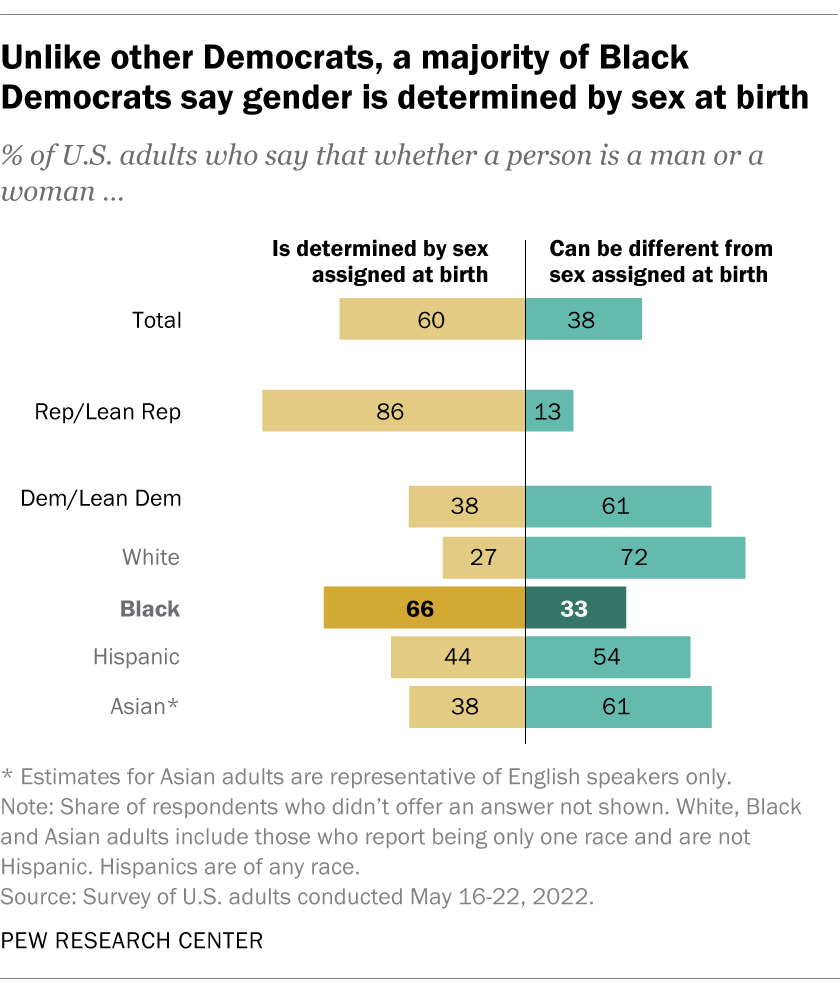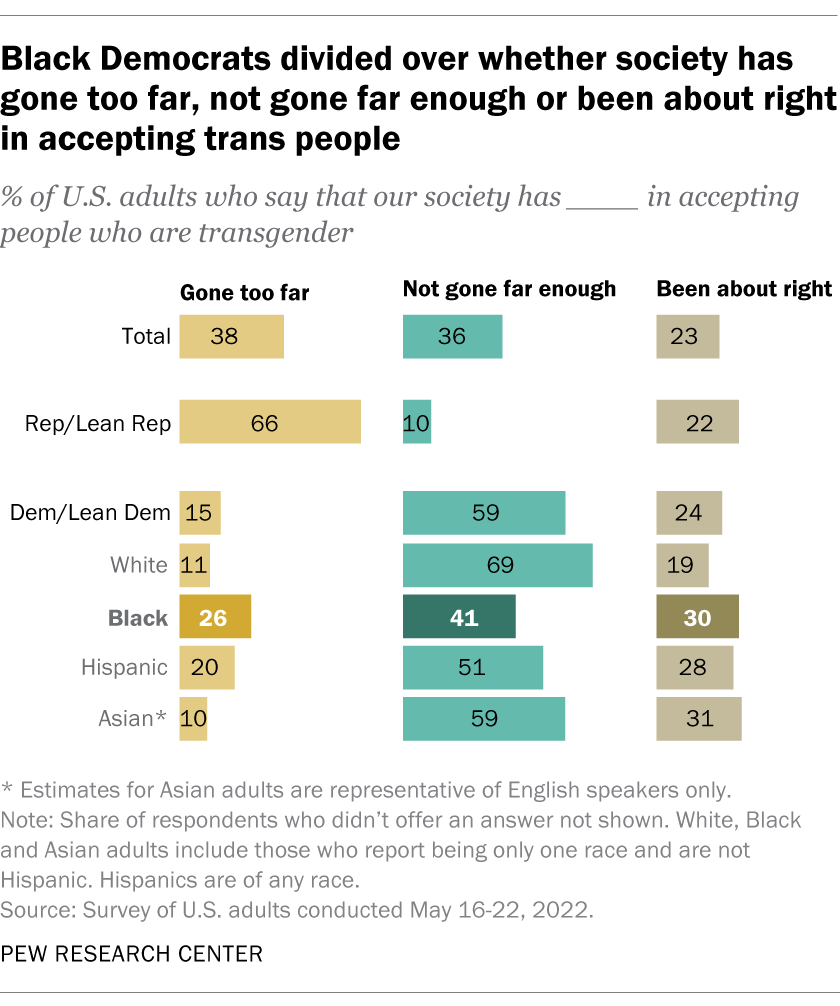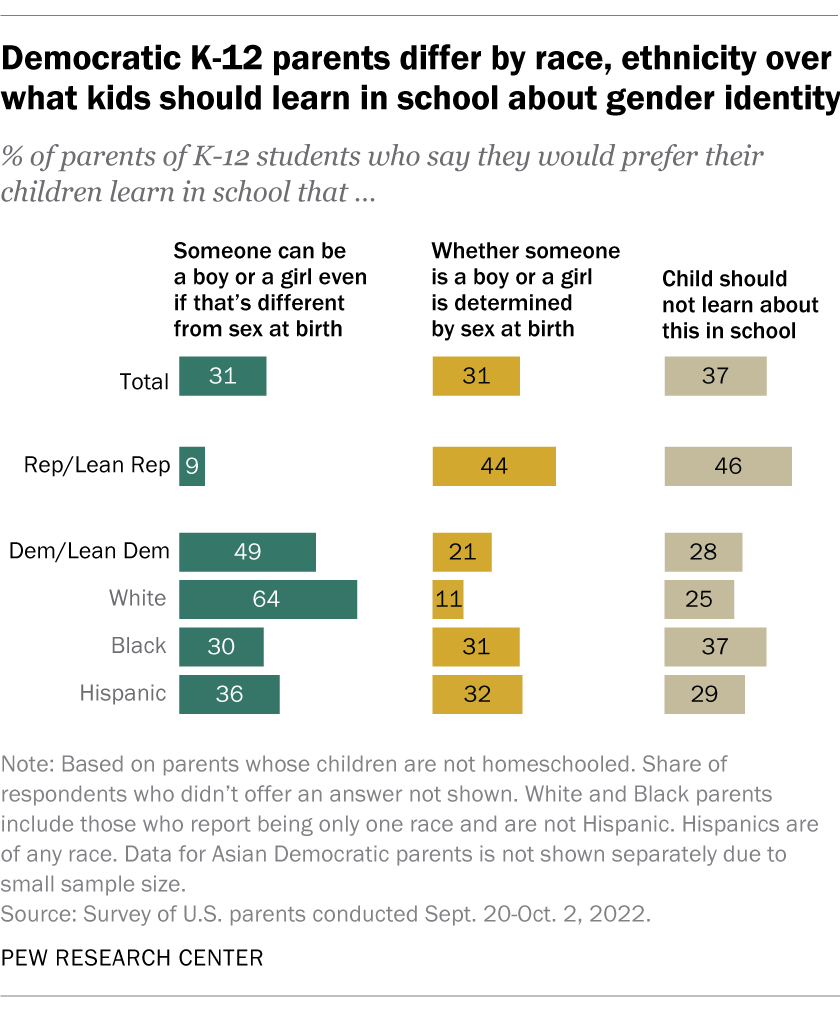Republicans and Democrats in the United States differ widely in their views on gender identity and transgender issues. But there are notable differences among Democrats, too, especially by race and ethnicity.

Overall, 60% of U.S. adults say that whether someone is a man or woman is determined by their sex at birth, while 38% say someone can be a man or woman even if that is different from their sex at birth, according to a May 2022 Pew Research Center survey. Most Republicans and Republican-leaning independents (86%) say someone’s gender is determined by sex at birth, while a majority of Democrats and Democratic leaners (61%) say someone’s gender can differ from their sex at birth.
This Pew Research Center analysis examines racial and ethnic differences in the views of U.S. Democrats and Democratic-leaning independents on key questions related to gender identity and transgender people. It is based primarily on data from two recent Center surveys: one conducted May 16-22, 2022, among 10,188 U.S. adults, and the other conducted Sept. 20-Oct. 2, 2022, among U.S. parents, including 3,251 parents with children in elementary, middle or high school.
Everyone who took part in the May 2022 survey is a member of the Center’s American Trends Panel (ATP), an online survey panel that is recruited through national, random sampling of residential addresses. This way, nearly all U.S. adults have a chance of selection. The survey is weighted to be representative of the U.S. adult population by gender, race, ethnicity, partisan affiliation, education and other categories. Read more about the ATP’s methodology. Here are the questions asked in the survey and its methodology.
For the September 2022 survey, most parents who took part are also members of the ATP. The survey also included an oversample of Black, Hispanic and Asian parents from Ipsos’ KnowledgePanel, another probability-based online survey panel recruited primarily through national, random sampling of residential addresses. Here are the questions asked in the survey and its methodology.
But Democrats’ views differ widely by race and ethnicity. Around two-thirds of Black Democrats (66%) say that whether someone is a man or woman is determined by their sex at birth. By contrast, 72% of White Democrats, 61% of Asian Democrats and 54% of Hispanic Democrats say that someone can be a man or woman even if that is different from their sex at birth. On this question, Black Democrats’ views are closer to those of Republicans than to the views of other Democrats.

When it comes to societal acceptance of transgender people, Americans as a whole are divided: 38% of adults say society has gone too far in accepting trans people, 36% say it has not gone far enough and 23% say it has been about right. A majority of Republicans (66%) say society has gone too far in accepting transgender people, while a majority of Democrats (59%) say it has not gone far enough.
On this question, too, there are some racial and ethnic differences among Democrats. In particular, Black Democrats are less likely than White, Asian and Hispanic Democrats to say society has not gone far enough in accepting transgender people.
Americans also differ by party – and within party – when asked about certain laws, policies and proposals that affect transgender people. Black Democrats are less likely than White, Hispanic and Asian Democrats to favor or strongly favor policies that protect transgender people from discrimination in jobs, housing and public spaces, as well as policies that require health insurance companies to cover medical care for gender transitions.
Black Democrats are more likely than other Democrats to favor certain other policies. For example, around a third of Black Democrats (34%) favor or strongly favor requiring transgender people to use public bathrooms that match their sex at birth. Support for such policies is lower among White (14%), Asian (20%) and Hispanic Democrats (24%).

Differences in Americans’ views about gender identity extend to their opinions about what children should learn in school, according to a more recent Center survey of K-12 parents in the U.S. conducted in September 2022. Parents of K-12 students differ sharply by party over whether their children should learn that someone’s gender is determined by their sex at birth or that someone can be a boy or girl even if that differs from their sex at birth.
Among Democratic K-12 parents, views again differ by race and ethnicity. Majorities of Black and Hispanic Democratic parents either prefer that their K-12 children learn that sex at birth determines whether someone is a boy or girl – or say that their children should not learn about this subject at school at all. By contrast, nearly two-thirds of White Democratic K-12 parents (64%) prefer that their children learn at school that someone can be a boy or girl even if that differs from their sex at birth. (There were not enough Asian American Democratic K-12 parents in the September 2022 survey to analyze separately.)
Black Democrats more likely than other Democrats to say religion influences their views on gender identity
What explains Black Democrats’ differences with other Democrats on questions related to gender identity and transgender people?
Black Democrats are generally more likely than other Democrats to describe their political views as moderate and less likely to describe their views as liberal. Black Democrats have also differed from other Democrats on certain social issues, including whether the legalization of same-sex marriage has been good for society. They tend to be more religious than other Democrats as well – and more likely to say religion influences their views on gender identity, according to the Center’s May 2022 survey.
Around four-in-ten Black Democrats (37%) say their religious views have a great deal or fair amount of influence on their views about whether someone’s gender can differ from their sex at birth. Fewer White (11%), Hispanic (21%) and Asian Democrats (22%) say the same. White Democrats, by comparison, are more likely than Democrats in all other major racial and ethnic groups to say their views on gender identity are influenced a great deal or fair amount by knowing someone who is transgender. White Democrats are also more likely than most other Democrats to say their views are influenced a great deal or fair amount by what they’ve learned from science.
